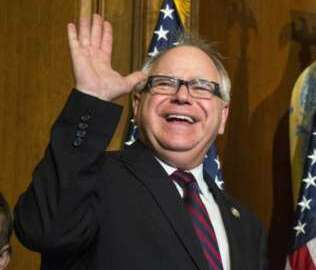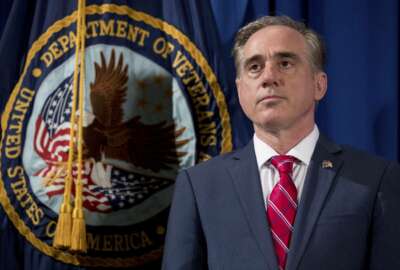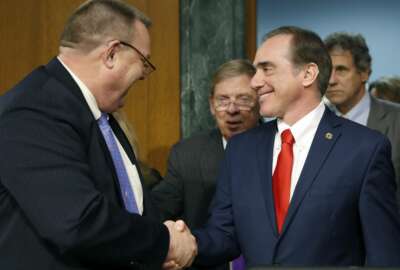
Why Shulkin believes new VA accountability law will ‘dramatically improve’ morale, recruitment
It's been a busy couple of months for the Veterans Affairs Department. But VA Secretary David Shulkin said he wouldn't have it any other way. He's pushing the VA...
Within the first few months of David Shulkin’s tenure as the secretary of the Veterans Affairs Department, he’s made several big plays: the plan to redesign the Veterans Choice Program, the decision to abandon VistA and adopt the same commercial, off-the-shelf electronic health record as the Defense Department and a promise to close underutilized or vacant VA buildings.
Those quick and decisive actions are part of the management style Shulkin said he’s purposefully bringing to the department.
“I am not looking for the same old practices and behaviors that led us to where we are now,” he told reporters during a Christian Science Monitor breakfast in Washington on June 20. “I am looking for a different type of leadership style from the people in my organization, and inherently, that’s going to be associated with risks, as long as it’s measured and we can determine when and if we need to adjust course on those decisions.”
Top Veterans Affairs Stories:
Shulkin’s tenacity comes, in part, from his tenure as VA’s undersecretary for health. Former President Barack Obama appointed him to the position in 2015, following reports of long wait times at VA hospitals across the country.
Shulkin said he saw VA make substantial, measurable improvements under his predecessor’s leadership. But based on his previous experience, Shulkin said he’s since learned VA needs to be more assertive. He said he’s shared that message with the department’s workforce.
“Slow, incremental, steady change isn’t what this organization needs,” Shulkin said. “What we need is bolder, fundamental change, dealing with the issues that — frankly — are really hard to deal with, that go back decades. That means, by definition, we’re going to have to take greater risks.”
One bold change will come in the form of the VA Accountability and Whistleblower Protection Act, which the president is expected to sign this week. Shulkin said he strongly believes the legislation is a step forward.
But Shulkin does recognize the concerns some have with the bill. He acknowledged it isn’t perfect.
“When you’ve been doing something for years and it’s not working, you can either continue to follow the same exact path or you can seek change,” Shulkin said. “I am seeking change, and I desperately need that change.”
He referenced VA’s delays in firing an employee at the department who was caught watching pornography while seeing patients as an example where VA could have used new accountability procedures.
Federal employees groups argued the accountability act would hurt the department’s ability to recruit and retain top talent. VA currently has more roughly 49,000 vacancies, most in health care professions.
“I believe this is going to dramatically improve morale, not hurt morale. This will improve recruitment, not hurt recruitment, because there is nothing more demoralizing than being in an organization, working alongside people that everybody knows no longer shares the values, the morals [and] the ethics of the vast majority of people who go to work every day for the right reasons and … serve veterans,” Shulkin said. “I know, from my own personal experience, that when people are allowed to remain in jobs that everybody knows have thumbed their nose at the organization and aren’t respecting the values of the organization, that is harmful, not helpful. I do not see this as a tool that’s going to lead to mass firings. I would never support that as secretary. I see this as a tool that’s going to be used on a small number of people, who clearly have deviated from accepted practices and norms.”
Some fear the disciplinary procedures in the Accountability and Whistleblower Protection Act will be a turn-off for federal employees, who may see that they have fewer due process rights at VA and may decide to take their talents to another agency.
“I am not looking to recruit from other federal agencies,” Shulkin said. “I’m looking to recruit in health care, from other health care organizations. Private health care organizations don’t have the types of accountability rules and restrictions that I have. I don’t think this puts us at a competitive disadvantage. If we lose the trust of our employees, if we misuse this accountability bill, if we’re perceived as making decisions that are arbitrary or unfair, then that will hurt our organization.”
He also encouraged other agencies who may be struggling to quickly dismiss their employees for poor performance or misconduct to take a look at VA’s new accountability legislation.
While the legislation eliminates the Merit Systems Protection Board as an appeal option for senior executives and gives the VA secretary the authority to remove, demote or suspend them for poor performance or misconduct, Shulkin said he won’t be the proposing and the deciding official on the same disciplinary action. Instead, he’ll play a role in the grievance process for many cases.
He signed a delegation of authority that puts employee supervisors, facility managers and regional directors in the chain of command for proposing and making such disciplinary decisions.
VA currently has about 1,500 cases in various stages of the disciplinary process. The majority of those employee cases will not follow the new procedures set in the accountability bill, Shulkin said.
The department is, however, beginning to internally clarify how it will handle some disciplinary cases differently in the future.
About 300 of the 1,500 current pending actions are drug diversion cases. Moving forward, VA will hold a “no-tolerance” policy for employees who steal drugs from the department.
“There will be an investigation,” Shulkin said. “People will have a due process, but if it is determined that our employees are involved in diverting drugs, there will be zero tolerance. We will move for [an] immediate removal.”
For Shulkin, being transparent about the department’s problems — and presenting VA’s potential solutions to those problems — is the only way he believes he can rebuild trust. President Donald Trump supports and holds the same view, Shulkin said.
The risks of failing to instill confidence in the veteran population, he said, are too great.
“I worry that if the public views the organization as not being competent in fulfilling its mission, that people who need our help — particularly those who are committing suicide — may not seek help,” Shulkin said.
Copyright © 2025 Federal News Network. All rights reserved. This website is not intended for users located within the European Economic Area.
Nicole Ogrysko is a reporter for Federal News Network focusing on the federal workforce and federal pay and benefits.
Follow @nogryskoWFED
Related Stories






